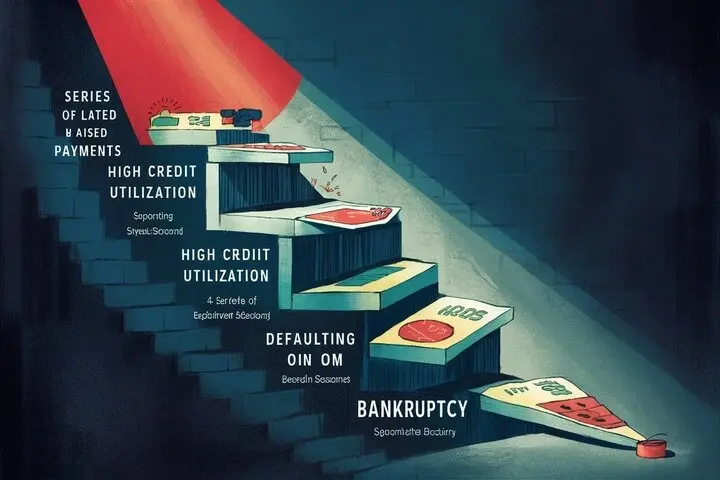-
Posted on: 26 Jul 2024

-
It is also an important factor that is used by creditors while deciding whether to offer you credit products such as credit cards, car loans, and mortgages. Me: A high credit rating means that when you apply for credit, you get a favorable rate as stipulated by the credit reference bureau. Nevertheless, several factors can drag your score down in case you are not careful:
This blog post will explain the top 5 things that detrimentally affect your credit score are
1. Missing Payments
The quickest way to damage your credit score is by defaulting on loans or failing to pay your credit card bills. The most significant of all credit score factors is the payment history, which contributes to the overall FICO credit score by 35 percent. It is a well-known fact that one missed or late payment, even if it is only by 30 days, can potentially shave up to 100-110 points off your credit score all at once. Any amount that is outstanding for 30 days or more is already tagged as ‘delinquent’ and the lender reports it to the credit bureaus. If there are many delinquencies, this indicates a high credit risk to other entities that may be considering lending to the applicant. A debt is considered severely delinquent if it is past the due date and hasn’t been paid for 90 days, and this results in another point deduction on your score. The non-payment of the debt if you finally default on the same for several months without paying, and the account is forwarded to the collection agency, the same remains a negative entry on the credit report for as much as 7 years and will significantly affect your creditworthiness.
2. High Credit Utilization
The second most significant factor that determines your score is the credit utilization ratio, which measures the amount of credit that you currently have against your total credit line and the number of credit accounts you possess. This means that if one owes a lot on their credit cards, they are considered to be of higher risk even after they have been paying their bills on time. It is advised that the credit limit used should not exceed 30% of the total available capacity. The use of most of their credit limit or even the utilization of a single credit card with a high limit can reduce the scores by 100 points or more. Paying your full statement balance each month through shooting ensures a low utilization balance. However, your reported balance may be high if, for instance, you tend to utilize a high percentage of your credit limit before your card issuer reports your balance to the credit reporting agencies every given month.
3. Too many openings of new accounts
The hard inquiry is when a lender checks your credit report to extend new credit, and this reduces your score a couple of points each time you make a new application. However, the same is even worse if you open too many new accounts in a certain period, which also hurts this score. It is problematic for other lenders if you open too many new accounts or if you charge high balances on newly opened accounts. It has also been recommended that, for the sake of keeping the loss as low as possible, one does not open more than 2 credit card accounts in 12 months. Furthermore, it is advisable not to stack many applications for 3-6 months, instead, you should submit them separately.
4. Cx = Inaccurate Information in Your Credit Reports
Mistakes can be made when credit reporting agencies receive information from creditors and other lenders. You can wake up one day to find that your credit reports have wrong loan balances, and some payments were reported as missed when in actuality they were made on time, there are accounts that you never opened, etc. Even small mistakes in credit reports can greatly affect credit scores and also make it difficult to qualify for new credit. Many people should make it a regular practice to review their credit reports from Equifax, Experian, or TransUnion at least once per year. In case you notice any mistakes in the reports concerning your credit scores and credit lines, open a dispute as soon as possible to rectify the mistakes. If properly managed, disputes have a net positive impact on your credit health in the long run.
5. Closing Old Credit Accounts
Although if you have, for instance, many credit cards that you do not use, then closing them would be beneficial, but it also has its demerits, such as reducing your length of credit history and total credit limits. All these lead to a reduction in credit score, especially if these accounts have been in existence for a long time. One piece of advice is never to close your oldest credit card account if you can avoid it, because it shows credit history, which is a good thing in the eyes of the lenders. Charge a small amount occasionally on old cards if you don’t have to pay an annual fee for their usage. The best strategy is only to downgrade cards that are newer and come with huge fees while maintaining the first card indefinably. It is advisable to ensure you have many other open revolving credit card accounts before closing down to avoid affecting your overall credit limit and length with your credit reporting agency.
Taking good care of the credit score involves continually checking the credit reports, timely payment of all the bills, minimizing credit card utilization, and a careful approach when applying for credit. Even one late payment or credit spree means that all efforts to maintain a good credit rating will be in vain. If it has lowered drastically at any given instance, then ensure you make payments on time and ensure that the balance is low so that you can reconstruct the score again. Take the time and let good credit behavior explain it all for you. One should refrain from applying for more credit, as it will keep the damage going until the score is built again. To be more precise, with the focused trial, even the credit score that was lowered by more than 100 points may be restored in one year for those who manage their credit obligations responsibly.
The content above reveals information on the five aspects that will likely reduce credit scores most significantly. If you only learn how to avoid credit pitfalls, your credit score will be fine for several years. If there is anything else credit-related that you would like me to write about for your blog, please do let me know.
Struggling with bad credit? Dial (888) 803-7889 for expert credit repair assistance!











